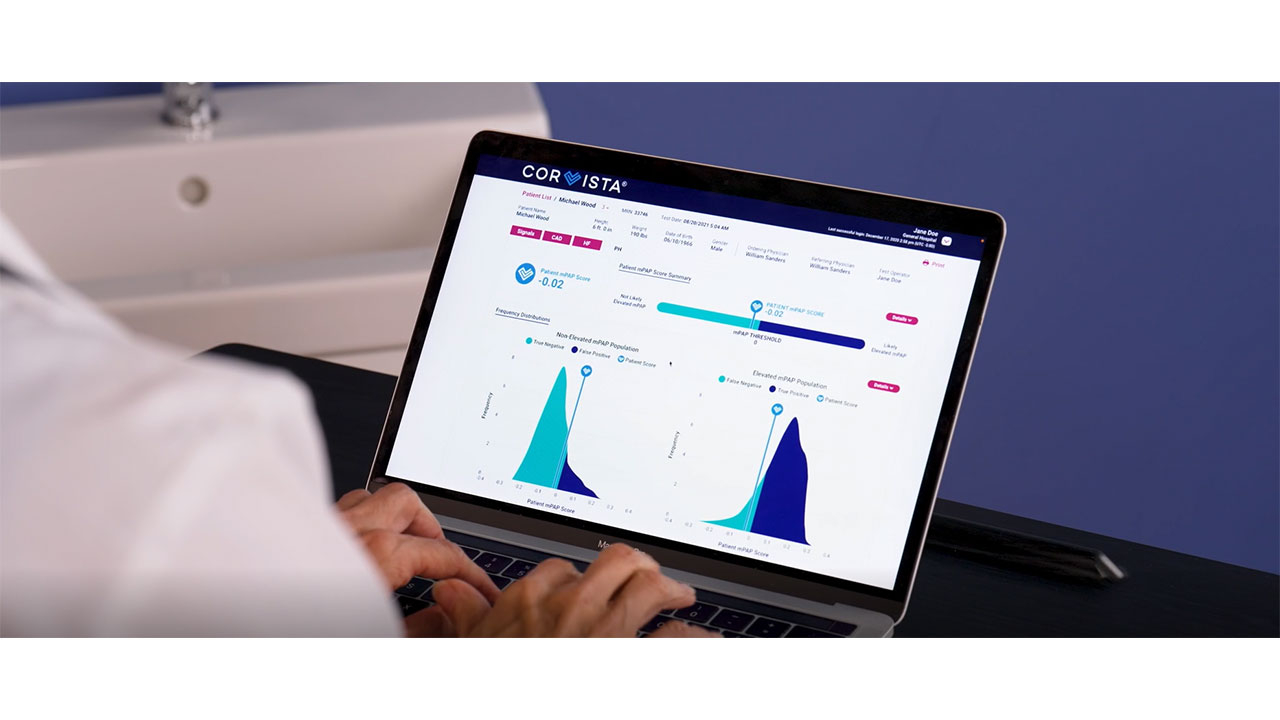The CorVista® Analysis Provides a Robust Prediction for Elevated Left Ventricular End Diastolic Pressure at the Point-Of-Care
The CorVista® Analysis Provides a Robust Prediction for Elevated Left Ventricular End Diastolic Pressure at the Point-Of-Care
IDENTIFY Study Results Published in PLOS ONE
WASHINGTON--(BUSINESS WIRE)--CorVista Health, Inc, a digital health company dedicated to improving cardiovascular disease diagnosis, announces the publishing of the IDENTIFY Study in PLOS ONE, the multicenter validation of a machine learned (ML) phase space electro-mechanical pulse wave analysis to predict elevated left ventricular end diastolic pressure (LVEDP) at the point-of-care. This publication follows the recent achievement of the Breakthrough Designation from the FDA for the CorVista System to aid in the diagnosis of pulmonary hypertension.
This IDENTIFY study prospectively validated a machine-learned approach based on the CorVista System’s novel approach to measure and analyze the patient’s electrical and hemodynamic signals at the point-of-care. The measurements are used for the prediction of LVEDP, a key indicator of heart failure. Consecutive outpatients across 15 US-based healthcare centers with symptoms suggestive of coronary artery disease were enrolled at the time of elective cardiac catheterization and underwent signal data acquisition immediately prior to angiography to pair with the LVEDP measurement. The primary objective was to validate a ML algorithm for prediction of elevated LVEDP using area under the curve (AUC) of the receiver operating characteristic as the measure of diagnostic accuracy.
“After our recent Breakthrough Designation for pulmonary hypertension, we are now pleased to publish the IDENTIFY Study and share the positive data in predicting elevated LVEDP.” said Don Crawford, President and CEO of CorVista Health. “The IDENTIFY study published in PLOS ONE demonstrates the potential of being able to aid in the diagnosis of elevated LVEDP, a key indicator of Heart Failure with Preserved Ejection Fraction (HFpEF), and cardiac conditions including other types of heart failure at the point-of-care.”
The study cohort consisted of 684 subjects stratified into three LVEDP categories, ≤12 mmHg (N=258), LVEDP 13-24 mmHg (N=347), and LVEDP >25 mmHg (N=79). Testing of the ML predictor demonstrated an AUC of 0.81 (95% CI 0.76-0.86) for the prediction of an elevated LVEDP with a sensitivity of 82% and specificity of 68%, respectively.
“It has been a truly exhilarating process to be involved in this rigorous and multidisciplinary work to bring forward this novel digital device” said Rola Khedraki, M.D., Division of Advanced Heart Failure and Transplant Cardiology, Scripps Clinic. “Our study demonstrated the feasibility of using a machine learned algorithm leveraging electromechanical signals to identify patients with elevated LVEDP with a high level of accuracy. We believe that the translatability of this novel technology into various clinical settings to identify patients with undifferentiated dyspnea at the point-of-care has the potential to be hugely valuable and impactful.”
The study concluded a machine learned algorithm utilizing electromechanical pulse wave features was able to predict an elevated LVEDP among symptomatic patients who had a precise measurement of LVEDP. These data suggest a potential role for the novel CorVista System to predict of an elevated LVEDP at the point-of-care.
The CorVista System is an investigational device Limited by Federal (or United States) law to investigational use.
About CorVista® Health
CorVista Health, Inc. is applying machine learning using real world test data to develop a novel cardiac diagnostic platform, CorVista® System, with the aim of transforming cardiovascular care and the patient experience. For more information, visit corvista.com
CorVista Health is focused on FDA’s recent call to action to better leverage health technologies to advance health equity as presented by FDA Commissioner, Dr. Robert Califf. Particularly, the decline of life expectancy in rural areas has been cited as key evidence of disparate health outcomes. CorVista System has potential to enable more equitable care by providing access to immediately actionable, high quality cardiovascular status results in low-resource settings, where access to capital-intensive equipment and the qualified specialists needed to operate them may not be available. In doing so, the CorVista System is uniquely poised to advance the quality of care in rural and low-resource settings.
About CorVista® System
CorVista System is a non-invasive point-of-care solution that is intended to synchronously collect and apply machine learning to a patient’s cardiac and hemodynamic signals to predict the likelihood of cardiovascular diseases without the use of radiation, contrast agents, injections, fasting or exercise. Within minutes of the test, the CorVista® Analysis is available in a secure web portal to aid physicians in rapidly diagnosing and treating patients with suspected cardiovascular disease, answering important clinical questions to guide better treatment decisions.
Contacts
CorVista Health, Inc.
Chris Bing Ernst
(415) 710-9445
cernst@corvista.com

